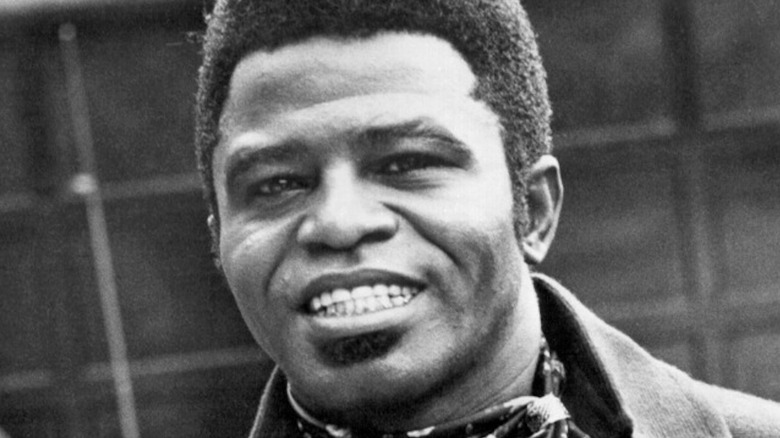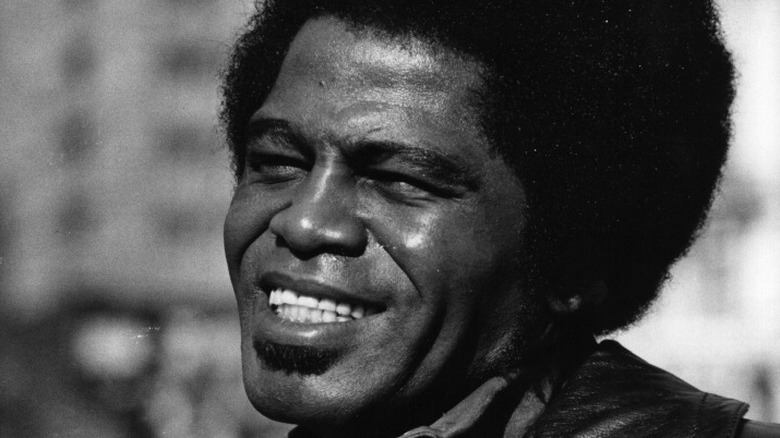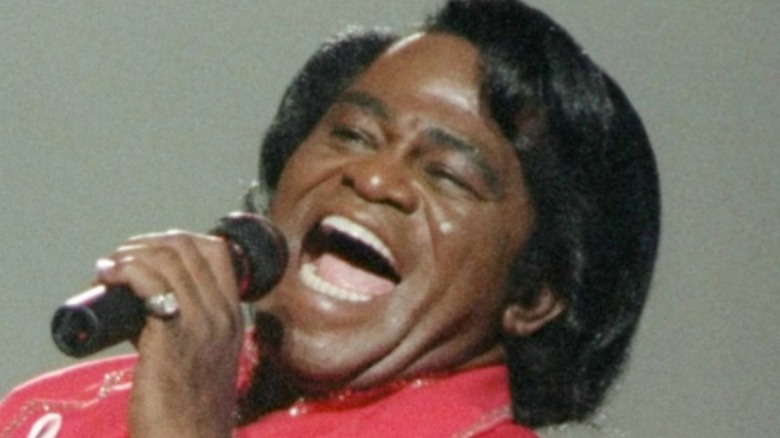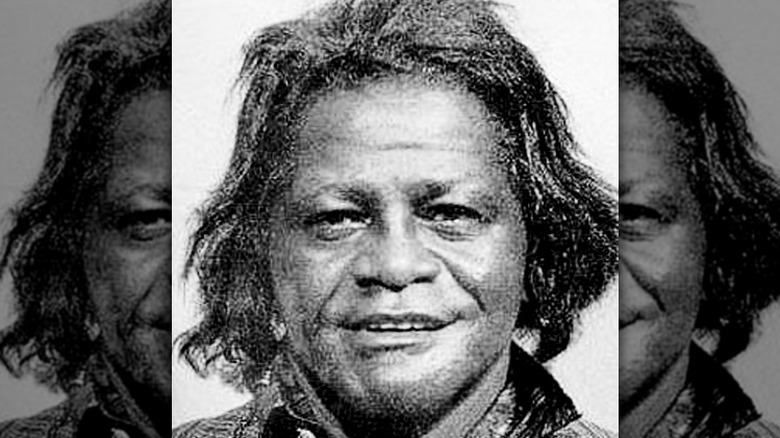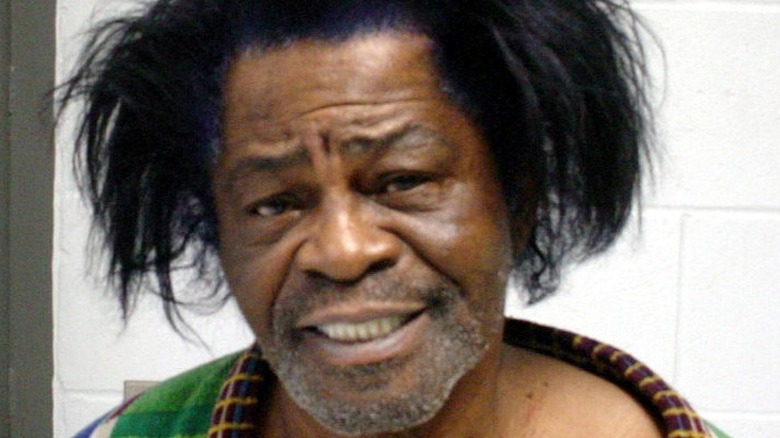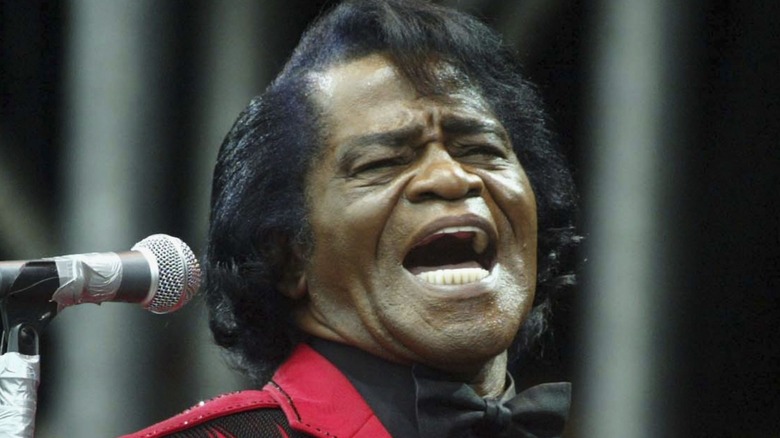The Criminal History Of James Brown, The Godfather Of Soul
Known widely as the "Godfather of Soul," James Brown was a dominating force in the music industry for decades. In the years that have passed since the release of his 1958 single "Please Please Please," Brown assembled a catalog of music that would be spread out over 60 studio albums (per Classic Rock History). His singles charted a whopping 110 times on the Hot R&B/Hip-Hop Songs chart, with 17 of his tracks earning the top spot (via Yahoo Entertainment News). Grammy Awards and his entry into the inaugural class of the Rock and Roll Hall of Fame added top honors to a storied career. But what might be an even higher honor is the influence he had on so many other musicians. Brown is known as the most sampled artist of all time, with over 5,200 tracks by other artists featuring snippets of his studio handiwork (per GQ).
Brown was a monumental force both on and off the stage. He began life with humble roots in rural South Carolina, working odd jobs to help his family survive (per Biography). Whether shining shoes or picking cotton, Brown was doing what he could to help his family scrape by. In his early teens, he began singing in church choirs, beginning his passion for music and showmanship. At 16, Brown had his first brush with the law. But it might have been the hand of fate guiding Brown down a path that would begin one of the most legendary careers in music.
James Brown's first known arrest as a teenager
Growing up in the Depression-era South would've been difficult for most anyone, and James Brown and his family were certainly no exceptions to the hardships of extreme poverty. Though Brown worked hard earning money when and where he could, the temptation got the better of him at 16. Brown stole someone's car and was arrested (per Biography). He was sent to serve a three-year prison sentence but made some life-changing moves soon after he arrived. Wanting to sing and perform, Brown set out to implement a prison church choir, which he organized.
While behind bars, Brown formed a friendship with another aspiring musician. Brown met Bobby Byrd while playing a game of basketball, the start of a relationship that would pave Brown's way to stardom after his release three years later. Byrd performed in the prison choir under Brown, and it was Byrd's family who took Brown in when he was paroled (per Goldmine Magazine).
Brown joined Byrd's group The Avons. The aspiring band of players went through several name changes throughout the early and mid-1950s before eventually settling on the name The Famous Flames in 1954.
Several years later in 1959, Brown and company made their debut at the Harlem Apollo. After a series of successful singles, Brown released what would be his first full-length album the following year, 1960's "Think." What began as a stint in prison culminated in a partnership that changed the trajectory of Brown's musical career.
Brown's most infamous arrest
Decades later, James Brown was seeing his successes begin to dwindle. The disco era took some of Brown and other soul and funk artists' thunder, leading to diminishing album sales and lower-charting singles (per Biography). But Brown was not down for the count. His performance of "The Old Landmark" in the 1980 comedy "The Blues Brothers" put his talents in front of a new generation of fans, and perhaps served as a reminder to his current base that he still had what it takes.
Brown wasn't finished. He recorded and released the single "Living in America" in 1985, his most successful showing in years. Aiding its rise to its No. 5 position on the Billboard charts (via Official Charts) was its inclusion in the hit film "Rocky IV." Brown was back in a big way.
But that success did not keep Brown out of trouble. After years of drug abuse, Brown began to spiral out of control. In early 1988, the singer was arrested on charges of illegally possessing a handgun and possession of the drug PCP (via History). But his legal woes were only beginning. That September, a drug-addled Brown burst into an insurance seminar brandishing both a shotgun and handgun. The police were called, prompting Brown to attempt a hasty retreat in his pickup truck. A wild chase was beginning.
Brown was found guilty and sentenced to prison
Rather than pull over for the police, James Brown kept driving. A high-speed chase ensued, with Brown leading his pursuers out of Georgia and into South Carolina. At one point, Brown tried to slam his truck into two police cars (per Time Magazine). This prompted police to begin firing their weapons at Brown's vehicle. They managed to hit Brown's tires, but Brown kept moving.
Miles down the road, Brown finally lost control of his truck and crashed it into a ditch (via History). He was arrested and sent to prison on charges of aggravated assault and failure to obey an officer. Those charges earned him a sentence of six years and six months at the State Park Correctional Institute in South Carolina.
Brown's wife at the time maintained that her husband's mental state was in disarray from the medication he was taking following jaw surgery. Brown himself offered an additional twist on the story, though. According to Brown, he was trying to surrender to a black police officer at the side of a roadway when several white officers approached and began breaking out the windows of his truck. Brown claimed that as he sped away, these same officers began to fire their weapons at him.
Brown served about half of his sentence and was freed in 1991, per Time Magazine. He picked up his career where he left off and began to tour once more. But his legal problems were not entirely behind him.
More arrests
The New York Times reports that James Brown was arrested again in 1998 on fairly serious charges. MTV News tells us that deputies had been trying to serve Brown with a probate order. Brown's family had been worried about his health, prompting the visit by officers. These deputies became concerned themselves when they noticed several spent ammunition casings. The officers also smelled marijuana. Believing him to have fired the weapons while under the influence of drugs, they took him into custody and transported him to a hospital in Columbia, South Carolina.
After being treated at that facility for prescription drug abuse, Brown was arrested a week after his release. He was charged with possession of marijuana and unlawful use of a firearm. For these charges, Brown was able to avoid prison. The court sentenced the singer to 90 days in a drug treatment program (via History).
In 2004, Brown was arrested for what is believed to be his final time in silver bracelets. His fourth wife, Tomi Rae Hynie, accused Brown of domestic assault and had him arrested. During an argument in their Beech Island, South Carolina home, Brown shoved his wife to the floor. He was arrested and released on bail (per Women's News). Brown denied the charges, stating, "I would never hurt my wife. I love her very much" (per Biography).
Brown's legacy supersedes his personal battles
James Brown's life was mired by multiple run-ins with the law, much of which could be attributed to his long struggle with substance abuse. Whether it was the painkillers he found himself hooked on late in life or the PCP he was ingesting during the 1980s, Brown's drug addiction certainly caused his life to take a different trajectory. But even though his mugshots made national news, his legacy as a showman and as a brilliant musician will most likely far outshine any legal or drug issues he had.
Aside from the countless hits, multiple awards from the music industry, and the fame and fortune that accompanied those accomplishments, Brown proved himself to be a significant influence on many musicians. Performers across all genres from pop to rock to hip hop have cited Brown's musical contributions as forces behind their successes. Biography notes that the likes of superstars Mick Jagger and Jay-Z have given accolades to Brown, and their careers might not have been the same without him. The soul and funk world we know would certainly be drastically different without Brown's music and stage performances, as would the products of countless others who looked to Brown as a pioneer.
James Brown died in 2006 after suffering from pneumonia. The 73-year-old entertainer left behind a unique and powerful legacy that still lives on in the samples of his music that is being produced by today's musicians.
